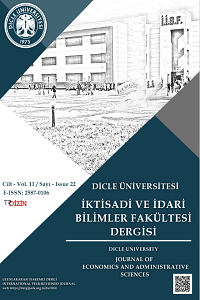Abstract
Bu çalışmanın amacı gelir eşitsizliğinin ithalat talebine etkisini araştırmaktır. Bu amaçla gelişmiş ülkelerde gelir eşitsizliğinin ithalatı artıracağı hipotezi Almanya örneği için 1979-2018 dönemi analiz edilerek sınanmıştır. Çalışmada Bayer & Hanck (2012) eşbütünleşme testi ile FMOLS ve DOLS tahmin yöntemleri kullanılmıştır. Analiz sonucunda elde edilen bulgular, gelir eşitsizliğinin ithalat talebini pozitif etkilediği şeklinde olup söz konusu hipotezi destekler niteliktedir. Çalışmada ayrıca ekonomik büyümenin ithalatı pozitif etkilerken reel döviz kurunun negatif etkilediği tespit edilmiştir. Sonuç olarak gelir eşitsizliğinin ithalatın ve dolayısıyla dış ticaret dengesinin bir belirleyeni olduğu görülmektedir. Bu durumda otoritelerin daha adil bir gelir dağılımı sağlayarak dış ticaret açığını hafifletebileceği söylenebilir.
References
- Adam, A., Katsimi, M., & Moutos, T. (2012). Inequality and the import demand function. Oxford Economic Papers, 64(4), 675-701.
- Ahad, M., Afza, T., & Shahbaz, M. (2017). Financial development and estimation of import demand function in Pakistan: Evidence from combined cointegration and causality tests. Global Business Review, 18(1), 118–131.
- Akturk, L.N., Yılancı, V., & Bozoklu, Ş. (2014). Spot ve türev piyasalar arasındaki etkileşim: Türkiye Örneği. 1.Karadeniz ve Balkan Ekonomik ve Politik Araştırmalar Sempozyumu, Eylül 2014, Zonguldak. Banerjee, A., Dolado, J., & Mestre, R. (1998). Error-correction mechanism tests for cointegration in a single-equation framework. Journal of Time Series Analysis, 19(3), 267-83.
Abstract
The aim of this study is to investigate the effect of income inequality on import demand. For this purpose, the hypothesis indicating income inequality causes to increase of import demand in developed countries has been tested by analyzing Germany over the period 1979 – 2018. In the study, Bayer & Hanck (2012) cointegration test and FMOLS and DOLS estimation methods were used. The findings of analysis show that income inequality has positive impact on import demand supporting the hypothesis in question. In the study, it has also been determined that while economic growth affects import positively, real exchange rate affects negatively. Consequently, it is seen that income inequality is a determinant of imports and thus foreign trade balance. In this case, it can be said that the authorities can alleviate the foreign trade deficit by providing a fairer income distribution.
References
- Adam, A., Katsimi, M., & Moutos, T. (2012). Inequality and the import demand function. Oxford Economic Papers, 64(4), 675-701.
- Ahad, M., Afza, T., & Shahbaz, M. (2017). Financial development and estimation of import demand function in Pakistan: Evidence from combined cointegration and causality tests. Global Business Review, 18(1), 118–131.
- Akturk, L.N., Yılancı, V., & Bozoklu, Ş. (2014). Spot ve türev piyasalar arasındaki etkileşim: Türkiye Örneği. 1.Karadeniz ve Balkan Ekonomik ve Politik Araştırmalar Sempozyumu, Eylül 2014, Zonguldak. Banerjee, A., Dolado, J., & Mestre, R. (1998). Error-correction mechanism tests for cointegration in a single-equation framework. Journal of Time Series Analysis, 19(3), 267-83.
Details
| Primary Language | Turkish |
|---|---|
| Subjects | Economics |
| Journal Section | Research Article |
| Authors | |
| Publication Date | November 29, 2021 |
| Submission Date | July 14, 2021 |
| Acceptance Date | September 17, 2021 |
| Published in Issue | Year 2021 Volume: 11 Issue: 22 |
Cite
Cited By
Analysis of factors affecting the import demand for wheat and corn in Türkiye using the Seemingly Unrelated Regression Method
Ege Üniversitesi Ziraat Fakültesi Dergisi
https://doi.org/10.20289/zfdergi.1467449
All works published in this journal are licensed under the Creative Commons Attribution-NonCommercial 4.0 International (CC BY-NC 4.0) License.

